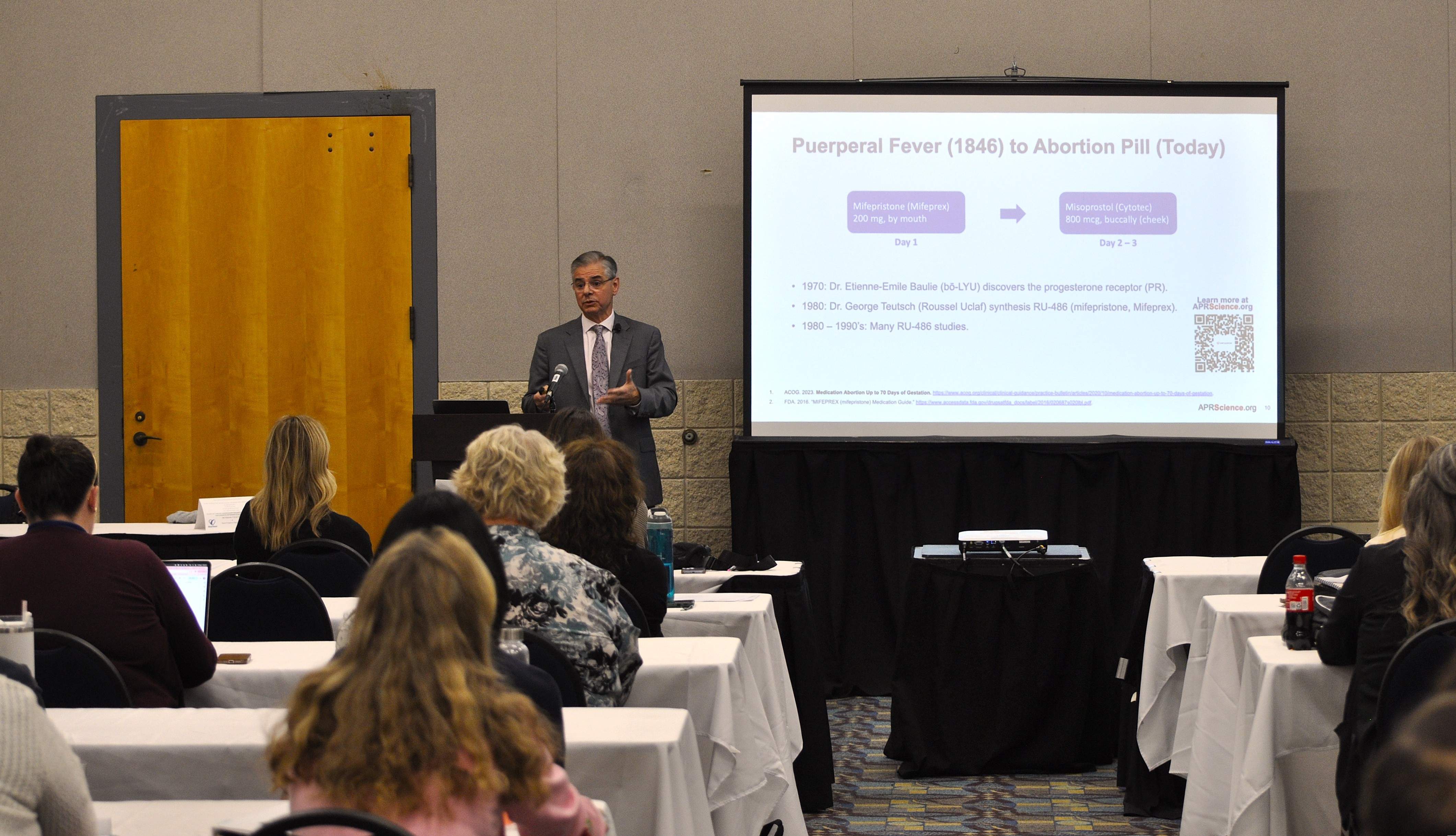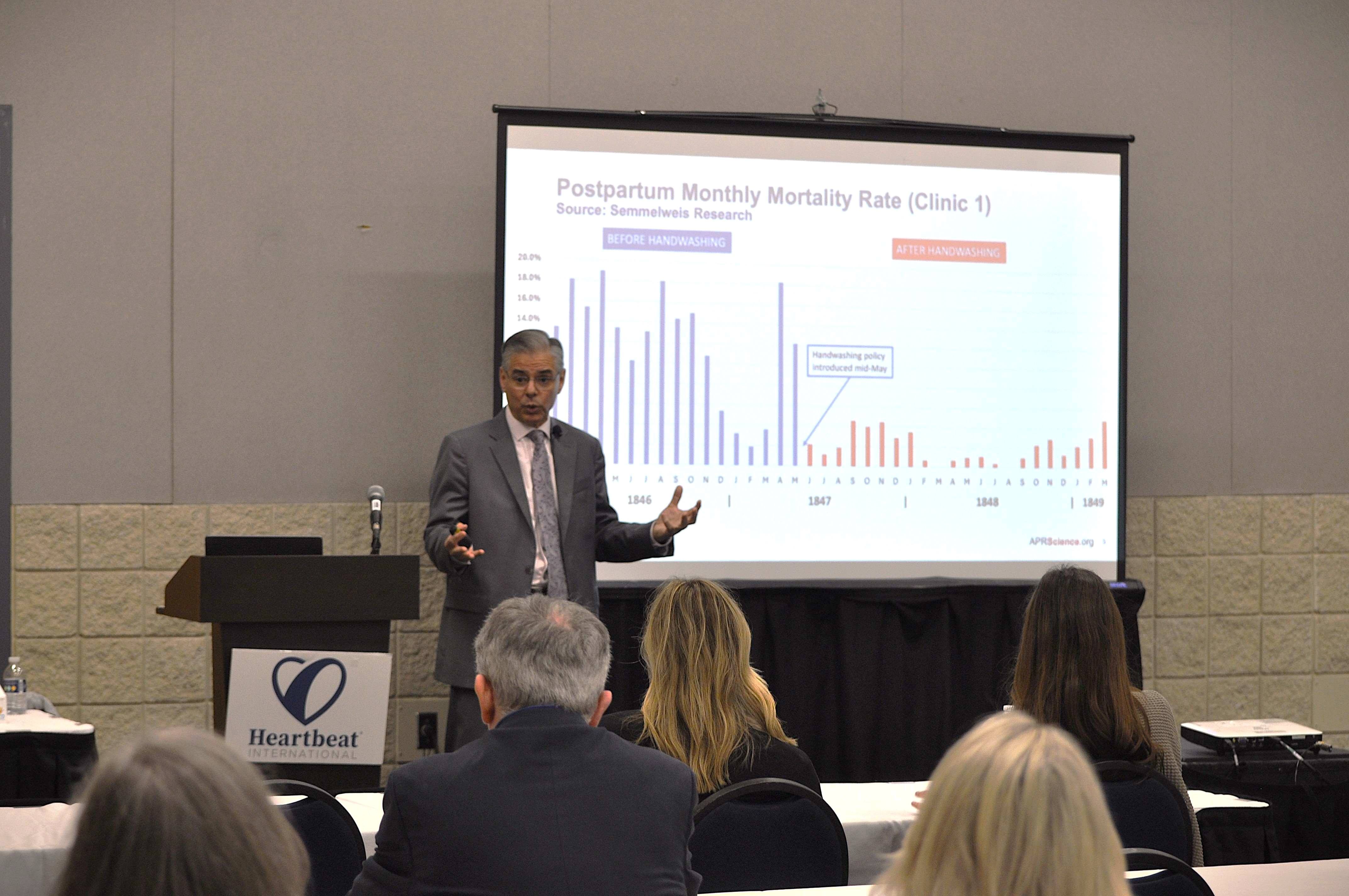One of the many high-quality workshops offered at the Heartbeat Conference this year was a talk given by Paul DeBeasi, director of APRScience.org, Massachusetts Citizens for Life.
In his presentation, he debunked 5 common Abortion Pill Reversal (APR) myths, offering research to combat each one. He also introduced a valuable resource, APRScience.org, which contains much of the information he presented as well as useful links to studies, data, and downloadable education materials.
While I am going to give a quick rundown of his talk, I encourage anyone who was not able to watch the presentation to visit the website or to check out the conference recording available on Heartbeat’s website (not yet available, so check in periodically!). DeBeasi’s talk was wonderful. He is a great teacher, the information flowed smoothly from one topic to the next, and he included a lot of examples and graphics to help people understand each point he made.
[Click here to subscribe to Pregnancy Help News!]
DeBeasi listed 5 common myths about APR — and I am sure for those reading, you have heard at least one of these!
- It is not possible to reverse an abortion once it is started.
- Embryo survival rates after APR are no different than placebo.
- APR is based upon junk science.
- APR is unsafe.
- APR may increase the risk of birth defects
The good news is, all these myths are just that — myths DeBeasi walks through each myth and combats it with research and data showing the truth of APR.

- You can reverse the effects of an abortion once it is started.
I have written on this topic for Pregnancy Help News before, and DeBeasi goes into some of the other details of the mechanisms by which progesterone can reverse the effects of mifepristone, also offering simple graphics to help visual learners conceptualize the process. Basically, progesterone and mifepristone are competing molecules in the body. By giving more progesterone to a woman, her body will use the extra progesterone to beat the mifepristone in competition for the spots they both want to bond to in the uterus.
- Embryo survival rates after APR are significantly higher than when a placebo (or nothing) is given.
DeBeasi walks us through several systematic reviews showing this is the case. A systematic review is a research paper that looks at a pool of other research papers and the findings within them, to draw large-scale conclusions by basically pooling multiple data sets. A woman who takes mifepristone without taking anything else has <25% of her baby surviving. A woman who takes progesterone after taking mifepristone can have anywhere from a 32-100% chance of saving her baby (depending mainly on how the progesterone is administered) — with an average chance of 67%. Those odds are quite a bit higher than placebo. You can find the systematic reviews he talks through here. Even ACOG admits progesterone works because they recommend that doctors do not give the depo shot (which contains a form of progesterone) to a woman who is undergoing a chemical abortion, because she has a higher chance of her abortion failing.
- APR is based upon perfectly legitimate science.
Detractors of APR like to say that studies about the power of APR are badly done because they are observational, not randomized control trials. They also like to point out that they were not done with ethics board approval. This is complete bunk. Observational studies, as DeBeasi points out, can be just as good for drawing correct conclusions as randomized control trials are. Plus, all but one paper on the power of APR mention involvement of an ethical or review board; the single paper that does not mention it, we cannot draw a conclusion either way about. Essentially, APR detractors are pointing to a single paper and making it seem like that is the truth for all positive evidence about APR — and that is simply not the case.
- APR is perfectly safe — in fact, it is safer than taking nothing, taking a placebo, or taking misoprostol after mifepristone.
I am sure you have heard this one before. In 2020, a paper by Dr. Mitchell Creinin made the news purportedly showing how unsafe APR was and how his study had to be cut short due to safety reasons. Well, as DeBeasi shows us with Creinin’s paper and several others, progesterone after mifepristone not only helps the baby have a better chance at living, but also helps the mom not experience serious hemorrhaging. It makes sense. Mifepristone is supposed to make a woman bleed vaginally; progesterone is supposed to help a pregnant woman stay pregnant. It is almost laughable how we are supposed to believe that something given to women for decades to help prevent miscarriage is suddenly useless to prevent abortion and super unsafe to take.
- There is zero available evidence to show that APR raises the risk of birth defects.
DeBeasi goes through what evidence is available related to mifepristone and birth defects, as well as progesterone and birth defects. He shows quite clearly that neither mifepristone nor progesterone have any measurable changes on the rate of birth defects in surviving babies. This means that if a woman takes mifepristone and decides to never take misoprostol, whether or not she takes progesterone, her baby, if he or she survives, is at no higher risk than any other baby of having a birth defect. This is so encouraging to be able to relay to women who are scared but want to take the first step in APR!

In the midst of ongoing attacks on APR, such as the academic publisher Sage retracting three research articles related to the negative outcomes of abortion due to social and political pressure, having the truth to combat the lies is as important as ever. The lay person usually only knows as much about abortion as what mainstream media puts out. With the media circulating and promoting myths that have no basis, it’s no wonder the average pro-choice person has no idea that APR is safe and effective.
To learn more about the information covered in DeBeasi’s presentation, visit APRScience.org. If you need a resource to give to a woman who needs APR, direct her to visit the Abortion Pill Reversal website or to call 1-877-558-0333.
Editor's note: Heartbeat International manages the Abortion Pill Rescue® Network (APRN) and Pregnancy Help News. Heartbeat is the subject of two lawsuits brought by state AGs concerning sharing information on Abortion Pill Reversal.





